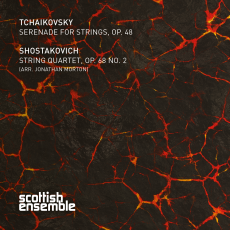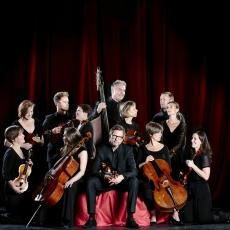Scottish Ensemble - Tchaikovsky & Shostakovich - Classics Today
Artistic Quality: 9
Sound Quality: 10
In Tchaikovsky's Serenade for Strings it's apparent from the outset that this is a leaner string texture than we are accustomed to hearing in this work. The Scottish Ensemble's relatively small forces produce a sound that's more sinewy compared to the power and lushness of the Berlin Philharmonic or the Philadelphia Orchestra, both of which released fine recordings of the Serenade. Conductor Jonathan Morton puts this quality to productive use, yielding a performance of exceptional textural clarity and articulation.
The first movement's arpeggiated chords resound as if strummed on a guitar, while the slow movement achieves an intimacy not always possible with a larger string body. Hearing the low strings so clearly delineated makes the finale's rapid counterpoint that much more exciting. And it's quite pleasing to hear Morton's careful attention to the music's dynamics and rhythm (listen to his beautifully nuanced handling of the Valse's rubato)-it's almost (almost) enough to get the sound of the traditional full-bodied performances out of your head.
The musicians approach Shostakovich's String Quartet No. 2 from the other direction-scaling up (instead of down) to string orchestra in Morton's own arrangement. Such arrangements tend to declaw the sound of a string quartet, as multiple unison strings acquire a softer timbre than solo instruments. Thus, the third movement's vigorous waltzing (recognizable from the finale of Shostakovich's Fourth Symphony) comes across more playful than menacing.
However, on the plus side the music has a less cloistered feel than usual-something that may or may not be what the composer intended. In any event, Morton and his band provide an engaging rendition, with excellent solo playing in the Recitative and Romance, where Shostakovich's nervous melancholy comes across quite effectively. The musicians' lively and vibrant performance of the Theme and Variations finale goes a long way to dispelling doubts, and it should be remembered that anyone coming to this piece anew would find it a moving and satisfying work-a testament to Morton's faithful arrangement, and to the Scottish Ensemble's impeccable playing. All told, this is an intriguing disc, made all the more enjoyable by the excellent recorded sound.

